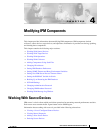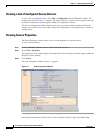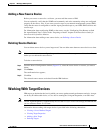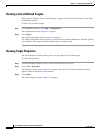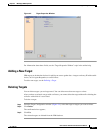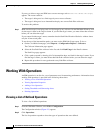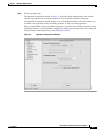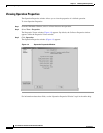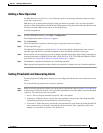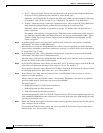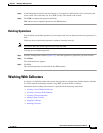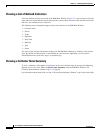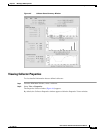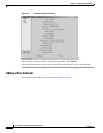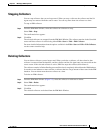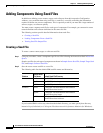
4-9
User Guide for Internetwork Performance Monitor
OL-11291-01
Chapter 4 Modifying IPM Components
Working With Operations
Adding a New Operation
An IPM operation is an alias for a set of parameters used for measuring performance between source
router and a target device.
IPM allows you to define packet priorities when you define an operation. You can select the packet
priority as either IP Precedence or DSCP, with IP Precedence being the default selection. Based on the
selection you make, IPM sets the values for the IP QoS Type.
To define an operation:
Step 1 From the IPM Main Window, select Edit > Configuration.
The Configuration window (Figure 2-3) appears.
Step 2 Click Operations.
The list of operations expands to show the types of operations that were defined.
Step 3 Click an operation type.
The Operation Configuration window (Figure 4-3) shows the default configuration for the selected
operation type and the list of operations expands to show all defined operations of that type.
Step 4 Set the options for the operation you want to define. Detailed information about defining operations to
measure performance for DHCP, DLSw, DNS, HTTP, IP, SNA, TCP, FTP, UDP, and Enhanced UDP is
provided in the “Using IPM to Measure Network Performance” chapter.
Step 5 Click Close to complete the definition of a monitoring operation.
IPM redisplays the Operation window and the new operation is added to the list of defined operations.
Setting Thresholds and Generating Alerts
From the Operation Configuration window, you can configure thresholds and event notifications on the
source.
To set thresholds and generate alerts using an operation:
Step 1 Select an existing operation or define a new operation by following the steps in Adding a New Operation.
Step 2 In the Generate Action Event field, select one of the algorithms to be used by IPM to calculate threshold
violations. The following values are possible:
• Never—Do not calculate threshold violations. This is the default.
• Immediate—When the latency exceeds the rising threshold or drops below the falling threshold,
immediately perform the action defined by Action Event Type.
• Consecutive—When the latency exceeds the rising threshold or drops below the falling threshold X
times consecutively, perform the action defined by Action Event Type. Optionally, specify the
number of consecutive occurrences. The default is 5.



